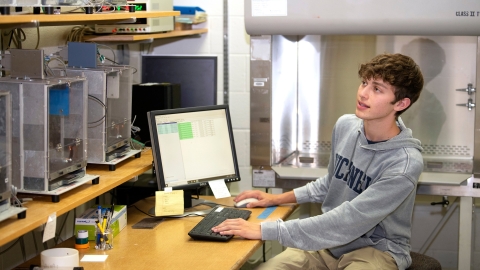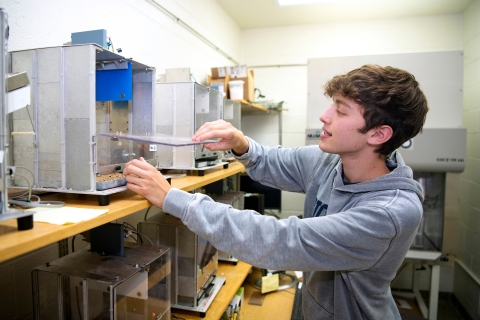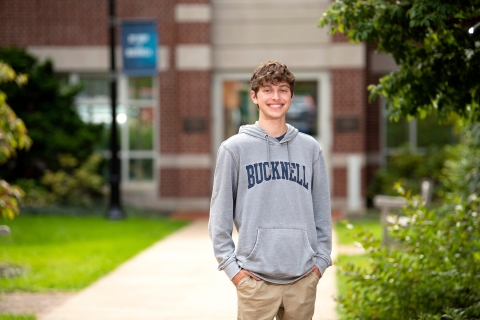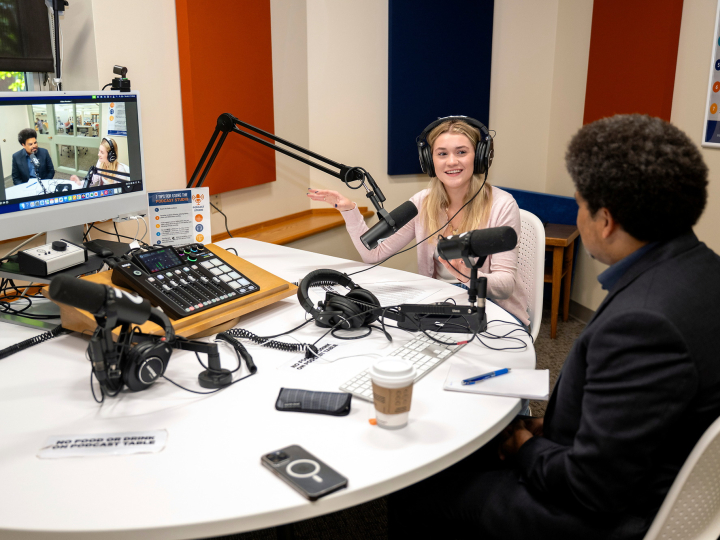
Henry Martin '25, Psychology and Spanish
April 29, 2022
Martin's study aims to analyze the effects of prarie voles' strong social bonds on operant conditioning, the process of teaching behavior through reward or punishment. Photo by Emily Paine, Communications
I'm always thinking about my connections and interactions with people around me. Understanding how and why we act in various social settings is something that really fascinates me.
No matter where he ended up enrolling, Henry Martin '25 knew he wanted to spend his college years immersed in research. But when he saw the offerings at Bucknell, "the opportunities were so fantastic, and that made all the difference."
Martin didn't have to wait long to access the impressive labs and resources that drew him to campus. Since his first year, he's been developing a research project in psychology, a discipline that's intrigued him since high school.
A longtime "theatre kid," Martin is used to questioning the thoughts, decisions and motivations of the characters he plays. But that curiosity doesn't end at curtain call.
"I'm always thinking about my connections and interactions with people around me," says the psychology and Spanish double-major from Wyckoff, N.J. "Understanding how and why we act in various social settings is something that really fascinates me."
At Bucknell, Martin is getting to explore that interest further by studying a mammal that offers insights into human social behavior. In partnership with Professor Jennie Stevenson, psychology, Martin is conducting a behavioral study on prairie voles — small rodents commonly found in central U.S. grasslands and Canadian prairies. These tiny, furry animals are highly social creatures known to form lifelong monogamous pair bonds.

Martin's operant conditioning testing employs a lever that, when pressed, delivers a pellet of food to two voles housed together in a glass box. Photo by Emily Paine, Communications
"Voles are very socially selective. Not only do they mate for life but they also prefer to associate with other voles they're familiar with," Martin explains. "So like humans, they're far more comfortable in situations where a friend is present."
Martin's study aims to analyze the effects of these strong social bonds on operant conditioning, the process of teaching behavior through reward or punishment. The testing employs a lever that, when pressed, delivers a pellet of food to two voles housed together in a glass box.
"At first, we let the pellets drop at random intervals without the voles taking any action, just so they know the reward is present," Martin says. "The goal is to have them learn that performing a specific action — using the lever — will make pellets appear when they want them."
To anyone who's ever trained a pet, the concept might seem straightforward, but the execution is far from simple.
"Prairie voles are new to operant conditioning. This type of training with this species hasn't been successfully done before," Martin explains. "So there's a lot of unknown territory being covered in this project."
Martin's first step was to source and configure the equipment. Because voles are anatomically different than rats and mice, which typically undergo this type of testing, Martin needed to modify commercially available equipment to suit the needs of his unique research.

With support from faculty, Martin is learning new skills as he modifies commercially available equipment to suit the needs of his unique research. Photo by Emily Paine, Communications
To ensure the dispensers could deliver a smaller-than-standard size pellet, for example, Martin disassembled and reassembled each dispenser with new parts. He also devised his own methods of wiring the lever to the circuit board responsible for delivering the voles' reward.
"A lot of this I've never done before, but it's been so fun to learn," he says. "Getting to take apart these devices and actually see how each one works is something that I didn't expect to be part of this topic I'm so interested in."
Martin says he owes much of his development to professors like Kevin Myers, psychology, whose guidance has helped Martin polish the skills he's adding to his tool belt. He says his confidence has grown, too, with support from Professor Stevenson.
"The professors are so great at explaining certain concepts that may be above your knowledge at that point in time," Martin says. "I feel like I've learned so much just in my first year of doing research."
Eventually, the vole study will look at the influence of the rodents' pair bonds on operant conditioning behavior. How does the presence of a friend impact the animals' motivations? Will the rate at which one vole seeks reward affect the rate of the other?
Martin is looking forward to discovering the answer.

